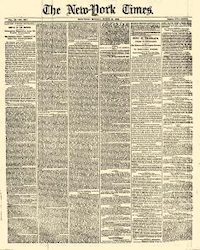The New York Times, May 24, 1860
Correspondence of the New-York Times:
PROVIDENCE, R.I., Wednesday, May 23, 1860.
I remember three months ago I was awaiting the arrival of one of the trains at the depot of the Boston and Providence Railroad, when the Shoreline train from New-York came rushing in, and a small group of people, among them several prominent politicians and two or three Policemen seemed to be anxiously looking for the arrival of some individual. They watched every face eagerly as they made egress them the car doors, and when every passenger was out, they turned back disappointed in not finding the object of their search. They were discussing the probability of his coming in the next train, or perhaps they had lost sight of him in the hurrying crowd. I imagined, from the intermixture of the Police among the group, that a rogue was to be caught, or that they anticipated some event in which the fingers of the Police might be serviceable. Just at this juncture, however, a tall, lean, gaunt, wiry, sleepy-looking individual, very commonly attired, standing at their elbow, attracted their attention, and very soon there was a cordial shaking of hands, a wonderful look of astonishment, and many a hearty laugh took place at the expense of “Honest Old Abe.” The mystery was solved It was Hon. ABRAM LINCOLN of Illinois, for whom they were seeking, who had come to speak on behalf of the Republican cause in Rhode Island. They, doubtless, anticipated a large, portly, neatly shaven, politician, of the Hale sort of man, but they found in the great antagonist of Mr. DOUGLAS, “one of the common people” to all appearances, whose features were bronzed by honest labor, plainly dressed, with no assumptions of dignity or ability. Those who saw this incident, and the mass of people who heard him earnestly and eloquently defend the principles of the Republican Party, at the opening rally of the State campaign, probably never dreamed of the announcement which, three months later, was to electrify the nation and to rouse the enthusiasm of the people.
The nomination of LINCOLN was received here with great surprise, mingled with a touch of disappointment. Those whose sagacity predicted the success of Gov. SEWARD, were more sadly disappointed than the rest, while the supporters of MCLEAN, rather those whose personal preference would have favored him over others, were aggrieved because they saw it was a severe stroke to the union of the Opposition, an event so desirable, and, in fact, imperatively necessary in the coming contest. This disappointment was but temporary. There is hardly a man in the State professing Republican principles that does not now heartily welcome the nomination. And whatever their individual preferences might have been, they appear willing to be satisfied with the choice of the Convention. A large portion of the Sprague Conservatives have rejoiced over the selection of “Honest Abe” as the standard-bearer of the Republican Party, while they repudiate SEWARD as too radical to lead the masses. Mr. LINCOLN evidently gains favor here daily, as his personal career and the principles he declares become better known.
The Democrats, who are all devoted to DOUGLAS, view the nomination as a strong one, “the strongest that could made in the Northwest.” Their principal organ, edited by a very capable and intelligent politician, thinks that the only man who can be pitted against LINCOLN, with any confidence for success, is Mr. DOUGLAS. They are true in this statement. As for Rhode Island, if Mr. DOUGLAS should be nominated, and these two heroes of the Illinois field be brought into combat there will be a tough campaign, with the odds in favor of LINCOLN. This is an honest and unprejudiced view of the field in this region. The Bell ticket receives but few supporters. There was a time when the names of JOHN BELL and EDWARD EVERETT would have been hailed with enthusiasm. But their glory has departed. The glory I mean of their political character and success. The times have advanced far ahead of their ideas. They belong to the political times of 1850, and to the anterior period, when the patriotic old Whig Party was in the height of its renown and prosperity. No two men are more respected for their eminent abilities, their worth and integrity, and the valuable services which they have tendered to the country. They are both patriots and will ever be regarded with warm admiration by the people of North and South. But at this day it requires something more than these qualities to ensure political success and to be popular with the masses.
The new State Government will be inaugurated on Tuesday next. At Newport ‘Lection Day is famous in local history, and a full programme will be carried out on this occasion. Gov. TURNER retires from the position which he has so acceptably filled during the past year with the glory of an honest and impartial administration of public affairs, which is a sufficient eulogium on his public career.
HIPPARCHUS.
